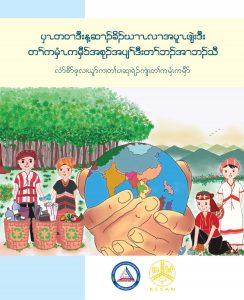Waste pollution is a global crisis. It’s polluting the air we breathe, the food we eat, and the water we drink therefore if it isn’t addressed properly and systematically, it will result in a twofold threats-to our health and environment’s. Globally, waste pollution is increasingly harming our environment, wildlife species, community health and well-beings. Despite waste pollution is a critical issue that we are facing in our lifetime, if we have a better understanding of the sources of waste (waste segregation through organic and inorganic) and have a proper waste management system and safe disposal, we can either individually and/or collectively minimize the impacts and adopt sustainable practices (behavioral change) like waste segregation, reuse/recycle, and composting to help realize waste management systems in our community. Therefore, our goal of producing this environmental education booklet is to encourage the readers, especially our Karen communities in Kawthoolei, to either individually and/or collectively address waste pollution problems effectively and sustainability in order to build a clean and healthy community and environment for the current as well as next generations to come. This booklet is categorized into 5 chapters as below.

Chapter 1: It gives an overview of the triple environmental threats: climate change, biodiversity loss, and pollution. It highlights the UN declaration that accessing to a clean and healthy environment is a universal right. It explains that plastic waste pollution is a major crisis in Karen communities.
Chapter 2: It describes the goal of producing this book and how to use it.
Chapter 3: It explains about environmental pollution-air, land and water. The meaning of pollution, waste, and the different types of waste/waste categories, and the consequences of not having systematic waste management.
Chapter 4: It introduces sustainable waste management systems and practices, the challenges of plastic waste pollution to some of the SDGs, the basic concepts of sustainable community development, waste management practices and strategies in a Karen context (refuse, reduce, separate, compost making, reuse, and safe disposal).
Chapter 5: It presents some hand-on activities that encourage the reader to carry out waste management practices, for example compost making, community waste monitoring, assessment and planning, and understanding of school waste generation and application of good practices-reduce, reduce and repurpose/upcycle.